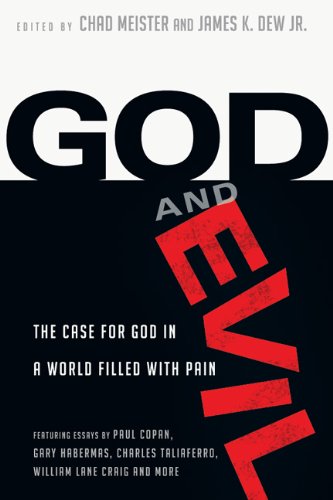Book review: God and Evil
by Chad Meister and James K. Dew Jr.
★★★★
Wherever you turn, evil rears its ugly head. This book is the case for God in a world filled with pain, and it makes for a sober read.
Meister and Dew have collated a series of essays about the problem of evil, with noted theologians—twenty one in all—examining the issues through several different lenses. It’s an interesting collection, with a myriad of different tones … some aggressive (the New Atheists get put in their place), some philosophical, one almost apologetic. While there are differences of opinion, all essays are by evangelical Christians, so the presentation is admittedly one-sided.
There are two basic types of evil discussed in this sort of debate: natural and moral. Hurricane Sandy is an example of natural evil, while Hitler is an example of moral evil. The question is, what sort of loving, omnipotent God would allow either?
To these two, I would add a third type, because it is what disturbs me most: eternal damnation. I was glad to see this topic addressed as well, and glad to see it included in a discussion of evil. Seldom do I see apologists really do justice to the utter horror of the word “eternal.”
I’ll award a special thumbs up to those articles that I found most captivating:
- James K. Dew Jr. does a good job of laying out a brief historical review of the dilemma of evil.
- James Spiegel discusses “soul-making theodicy,” the argument that suffering is good for us, and it led me to some interesting research in the Bible.
- Chad Meister questions whether the “hiddenness” of God is an evil, and while the whole topic leaves me a bit nauseous, it opened my eyes to the way many Christians think. Many are genuinely baffled at why God does not reveal himself to everybody.
- Gregory E. Ganssle argues that the existence of evil not only fails to disprove God’s existence, but provides evidence for Christianity! I didn’t see that one coming!
- Two essays at the end are interesting, on Intelligent Design and the role of evil in evolution, though they are in conflict with one another. One is by known ID proponent William Dembski, and one by Karl W. Giberson teamed with Francis S. Collins.
Finally, there is a transcript of a debate in the final pages of the book between a believer (William Lane Craig) and an atheist (Michael Tooley), which fails to inspire … the two miss each other like ships in the dark. I did chuckle, however, at Tooley’s argument that if Jesus were truly raised from the dead, it was surely by the evil Old Testament Yahweh whom Jesus worshipped rather than by “God,” the all-good, omni-everything being, Christians today worship. Who else would resurrect someone as vindictive as Jesus? I’m sure that went over well!












 354 Circles
354 Circles
 603 Goodreads Friends & Fans
603 Goodreads Friends & Fans

 Hello! I'm an author, historical Jesus scholar, book reviewer, and liberal Christian, which means I appreciate and attempt to exercise the humanitarian teachings of Jesus without getting hung up on any particular supernatural or religious beliefs.
The Bible is a magnificent book that has inspired and spiritually fed generations for thousands of years, and each new century seems to bring a deeper understanding of life’s purpose. This is true of not only Christianity; through the years, our age-old religions are slowly transforming from superstitious rituals into humanitarian philosophies. In short, we are growing up, and I am thrilled to be riding the wave.
I avidly read all thought-provoking religion titles. New authors: I'd love to read and review your book!
Hello! I'm an author, historical Jesus scholar, book reviewer, and liberal Christian, which means I appreciate and attempt to exercise the humanitarian teachings of Jesus without getting hung up on any particular supernatural or religious beliefs.
The Bible is a magnificent book that has inspired and spiritually fed generations for thousands of years, and each new century seems to bring a deeper understanding of life’s purpose. This is true of not only Christianity; through the years, our age-old religions are slowly transforming from superstitious rituals into humanitarian philosophies. In short, we are growing up, and I am thrilled to be riding the wave.
I avidly read all thought-provoking religion titles. New authors: I'd love to read and review your book!
 Hi! While Lee writes the articles and reviews the books, I edit, organize, and maintain the blog. The views expressed here are Lee's but I'm his biggest supporter! :-)
Hi! While Lee writes the articles and reviews the books, I edit, organize, and maintain the blog. The views expressed here are Lee's but I'm his biggest supporter! :-)
Connect With Me!